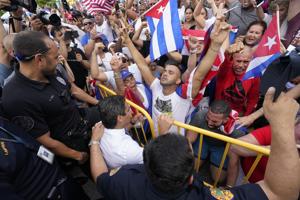As ‘anti-riot’ law is tested, Florida nixes mediation in federal suit seeking its repeal

(The Center Square) – As anti-communism demonstrations in support of protests in Cuba pose the first test for Florida’s controversial “anti-riot” law, a federal judge is pondering dueling motions, with the state seeking to dismiss lawsuits challenging it as unconstitutional and plaintiffs petitioning for an injunction suspending its enforcement.
The ACLU, NAACP, Community Justice Project and Dream Defenders in May filed a 62-page federal lawsuit claiming the Combating Public Disorder Act – in effect since Gov. Ron DeSantis signed it April 19 – will have a chilling effect on protected speech and violates equal-protection and due process rights.
Chief U.S. District Judge Mark Walker ordered mediation to begin July 12 but, on Tuesday, attorneys for Attorney General Ashley Moody and DeSantis motioned to forego mediation because it would not be “a worthwhile use of the parties’ or the court’s resources” and to dismiss the case.
“The only relief plaintiffs seek is a declaration that the act, or portions thereof, are unconstitutional and enjoinder of its enforcement. No monetary damages are sought,” the three-page motion reads. “Mediation cannot result in any negotiated relief to plaintiffs because they seek to strike statutes enacted by the Florida Legislature which the parties have no legal authority to agree are unconstitutional.”
On Wednesday, the civil rights groups petitioned Walker to issue an injunction against the Combating Public Disorder Act, describing its enforcement language as an unconstitutionally vague “guilt-by-association ‘round-up’ provision” that encourages “arbitrary and discriminatory enforcement.”
“Plaintiffs and their members are reasonably frightened, not only because they could be arrested and held without bail for peacefully demonstrating, but also because (under the law) it is more likely that plaintiffs and their members could be seriously injured or killed by people who disagree with their message,” the motion reads.
The petition does not reference demonstrations that have boiled onto Florida streets this week in support of Cubans protesting against the island nation’s 62-year-old communist regime that have blocked roadways in several cities, including Miami and Tampa.
The Florida Highway Patrol opted not to make arrests when demonstrators blocked Palmetto Expressway in Miami Tuesday, but Tampa Police arrested two men when they attempted to block I-75, the first to be charged under the “anti-riot” law.
When Florida lawmakers adopted the 61-page House Bill 1, their guiding reference was last summer’s police brutality protests. Few likely envisioned its first test would be spurred by anti-communism protests largely initiated by conservative Cuban-Americans.
Florida Senate Democrats in a Wednesday letter asked Moody to offer her legal opinion on how the law can be selectively enforced.
“We believe it is critical for every Floridian to be treated equally, and since we’ve seen peaceful protests emerge across various municipalities and local governments — many spilling onto state roadways — it’s critical that elected officials and Floridians alike have clarity from your perspective as Florida’s chief legal officer as it relates to the new statute,” states the letter, authored by Senate Democratic Leader Sen. Lauren Book, D-Plantation.
Democrats said the opinion is necessary for clarity in ensuring the “protection” of demonstrators under the new law which, they noted, had not been enforced anywhere in the state until Tuesday’s arrests in Tampa.
“We are pleased and frankly thankful the draconian and anti-democratic measures contained within HB 1 have not been weaponized against those who are peacefully protesting,” Senate Democrats wrote.
The coalition’s May filing is not the only federal lawsuit lodged against the “anti-riot” bill.
Lawyers Matter Taskforce, Legacy Entertainment & Arts Foundation, Black Lives Matter: Tampa and the Community Empowerment Project filed a legal challenge against HB 1 on April 21 in Orlando. The case is pending.
Disclaimer: This content is distributed by The Center Square
